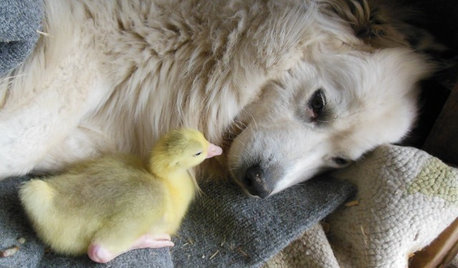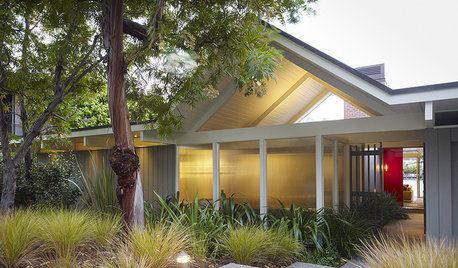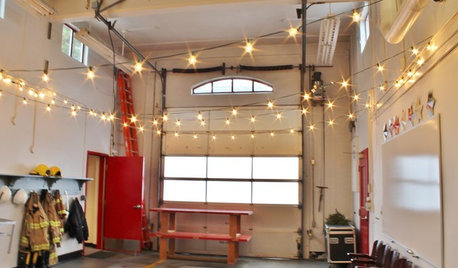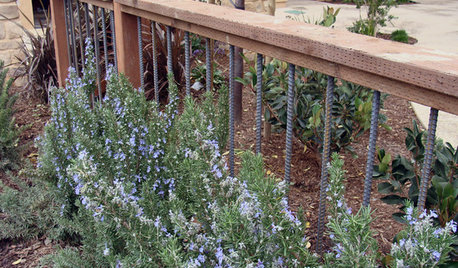Why I vow to never support the Peat industry for my entire life.
hoorayfororganic
16 years ago
Featured Answer
Comments (107)
justaguy2
16 years agolast modified: 9 years agolou_spicewood_tx
16 years agolast modified: 9 years agoRelated Discussions
To use peat pots or not to use peat pots?
Comments (25)Let me start out by saying I'm no expert, but have been gardening, lets say 60+ years. I love peat pots because of easy plant watering and easy planting. Yes, I use all kinds of little and big solid containers but peat pots let me keep using two words, easy & reliable. This is my approach. Never buy a jiffy peat pot because they are too thick, too short and have no holes for water absorption. There are peat pots out there ½ the thickness of jiffies, aprox an inch deeper and most important they have at least 4 slits around the bottom that go up about ¾ inch. This all leads to easy watering by putting 18 pots in those black plant trays you see everywhere. Put the tray where you want it, put an inch or plus of water in the tray, come back next day to see if top is damp, if not, put more water in tray. Just keep top damp about 50% of the time. One more little item-----is the tray & water level? If not get that level out and make it so. This is nearly always necessary in my state of TN. When planting take your finger and with a little thump the wet bottom will fall off without disturbing the root system..That's it, nothing fancy....See MoreOur Story Using TV Shows....The Entire Story Line
Comments (2)Thanks for all your hard work Karen! Can't wait to read it in its entirety. Jodi-...See MoreWhy Never Any Pics Of SWG Damage???
Comments (37)I posted up above, but as an update we're entering our 2nd season with the SWG and no problems as of yet. The waterfall and grotto are flagstone and the water washes across them when they're running. Initially we were getting some small flakes of stone in the pool, that was before the SWG was installed. Over time the flaking has stopped which is not attributable to the SWG, but rather the fact that the loose pieces of stone from the installation have now sluffed off. Anyway, there's no indication that the SWG is making things worse. We'll know if it does because we'll see stone fragments in the pool. I will certainly report back here if that ever happens. I have a good friend that is on his 6th season with flagstone coping and SWG and his is doing fine as well. We're both in Forney, just east of Dallas....See MoreWhy we should not support the peat moss industry
Comments (22)HECK! I'm just gonna post the whole darn article it's so good! Check this out. This has strongly reinforced my views! PDF version: [url]http://www.puyallup.wsu.edu/~Linda Chalker-Scott/Horticultural Myths_files/Myths/Horticultural peat.pdf[/url] Linda Chalker-Scott, Ph.D., Extension Urban Horticulturist and Associate Professor, Puyallup Research and Extension Center, Washington State University The Myth of Permanent Peatlands: "Peat moss is an environmentally friendly organic amendment essential for many horticultural purposes" The Myth Peatlands are specialized types of wetlands whose value to human civilization has been recognized for centuries. Perhaps the most continued use of peatlands is as a fuel source: chunks of peat are cut from bogs, dried, and used for cooking and heating purposes. Though many societies have turned to other forms of energy production, this practice continues today especially where other fuel sources are absent. Peat moss, a principal plant component of peatlands, has also been an important part of the horticulture industry; itÂs used as a soil amendment both in gardens and container plants and as an aesthetic topdressing for potted plants and floral arrangements. Consisting primarily of Sphagnum species, peat moss has an amazing capacity to hold water like a sponge, slowly releasing it as the surrounding soil dries out. Since peat is 100% natural, it must be a truly "green" gardening product  right? The Reality The "greenness" of any product is determined both by the environmental friendliness of the product and its method of production. Unfortunately, there is no economically realistic, environmentally friendly way to harvest peat moss. This is a natural resource that accumulates at the glacially slow rate of 0.5  1.0 mm per year, or about 1/4 of an inch. Peat harvesting involves the removal of deep layers of peat that have literally taken centuries to accumulate. In fact, since harvesting implies sustainability, it is more accurate to describe commercial peat removal as mining. While peat used for fuel can be necessary for human survival, that used for modern horticultural purposes is not and therefore represents luxury consumption. For consumers to make an informed decision about whether or not to use peat moss requires an understanding of the roles peatlands play in the environment. Like other wetlands, these systems help purify and store water. Perhaps most important is that they are the single largest terrestrial store of carbon, equivalent to 75% of all carbon in the atmosphere (CC-GAP, 2005). Paradoxically, the destruction of peatlands is not yet recognized as a significant part of global climate change. Most damaging to educational efforts regarding peatland conservation is industry assertions that there are no substitutes for peat moss in horticultural applications. Similarly, there is often a perception that this natural......See Morehoorayfororganic
16 years agolast modified: 9 years agomadmagic
16 years agolast modified: 9 years agohamiltongardener
16 years agolast modified: 9 years agohamiltongardener
16 years agolast modified: 9 years agothe_virginian
16 years agolast modified: 9 years agohoorayfororganic
16 years agolast modified: 9 years agojustaguy2
16 years agolast modified: 9 years agojustaguy2
16 years agolast modified: 9 years agothe_virginian
16 years agolast modified: 9 years agolou_spicewood_tx
16 years agolast modified: 9 years agohamiltongardener
16 years agolast modified: 9 years agohamiltongardener
16 years agolast modified: 9 years agolorna-organic
16 years agolast modified: 9 years agoalphonse
16 years agolast modified: 9 years agolorna-organic
16 years agolast modified: 9 years agodicot
16 years agolast modified: 9 years agopnbrown
16 years agolast modified: 9 years agojustaguy2
16 years agolast modified: 9 years agopnbrown
16 years agolast modified: 9 years agojimmy0058
16 years agolast modified: 9 years agosouthsounder
16 years agolast modified: 9 years agoadirondackgardener
16 years agolast modified: 9 years agogonebananas_gw
16 years agolast modified: 9 years agotrancegemini_wa
16 years agolast modified: 9 years agopnbrown
16 years agolast modified: 9 years agogonebananas_gw
16 years agolast modified: 9 years agotrancegemini_wa
16 years agolast modified: 9 years agordak
16 years agolast modified: 9 years agopnbrown
16 years agolast modified: 9 years agogonebananas_gw
16 years agolast modified: 9 years agojk1550
16 years agolast modified: 9 years agoadirondackgardener
16 years agolast modified: 9 years agojustaguy2
16 years agolast modified: 9 years agothe_virginian
16 years agolast modified: 9 years agoadirondackgardener
16 years agolast modified: 9 years agothe_virginian
16 years agolast modified: 9 years agoadirondackgardener
16 years agolast modified: 9 years agojustaguy2
16 years agolast modified: 9 years agooregon_veg
15 years agolast modified: 9 years agogonebananas_gw
15 years agolast modified: 9 years agooregon_veg
15 years agolast modified: 9 years agogonebananas_gw
15 years agolast modified: 9 years agoadirondackgardener
15 years agolast modified: 9 years agotrancegemini_wa
15 years agolast modified: 9 years agooregon_veg
15 years agolast modified: 9 years agooregon_veg
15 years agolast modified: 9 years agotrancegemini_wa
15 years agolast modified: 9 years agooregon_veg
15 years agolast modified: 9 years ago
Related Stories

REMODELING GUIDESThe 4 Stages of a Remodel: The Renewal of Vows
In this stage, you’ll reconnect with your original vision of your home and finally start seeing it come together
Full Story
HOUZZ TV FAVORITESHouzz TV: Life, Love and Purpose Down on the Farm
A Missouri native proves that you can go home again — and discover something entirely unexpected
Full Story
MOST POPULARThree Magic Words for a Clean Home and a Better Life
Not a natural tidying and organizing whiz? Take hope in one short phrase that can change your life forever
Full Story
ARCHITECTURERoots of Style: Midcentury Styles Respond to Modern Life
See how postwar lifestyles spawned a range of styles, including minimalist traditional, ranch, split level and modern shed. What's next?
Full Story
MOST POPULAR8 Life-Enhancing Home Resolutions for the New Year
You can take steps to make this the year your home truly becomes a place of comfort and joy
Full Story
HOUZZ TOURSMy Houzz: Reinventing a 1930 Fire Station for Family Life
Don't sound the alarm because the fire engine is gone; this remodeled station now happily hosts fundraisers and two generations of a family
Full Story
CONTEMPORARY HOMESHouzz Tour: Later in Life, a Bold New Design Adventure
A Washington, D.C., couple in their 70s embark on a new marriage and an innovative renovation of a historic row house
Full Story
INDUSTRIAL STYLEHouzz Tour: Industrial Rococo Style in a London Courtyard Flat
Raw materials, a lush living wall and a creative approach to decor are highlights in a filmmaker and a restaurateur’s warehouse apartment
Full Story
INDUSTRIAL STYLE9 Imaginative Ideas for Industrial Rebar in the Garden
Inexpensive and unexpected, steel bar from any big-box hardware store can give your landscape an edgier look
Full Story
KITCHEN DESIGNStandouts From the 2014 Kitchen & Bath Industry Show
Check out the latest and greatest in sinks, ovens, countertop materials and more
Full Story



Kimmsr